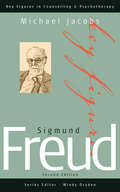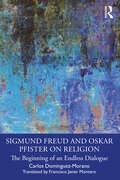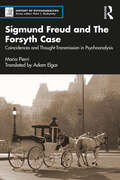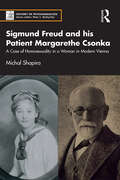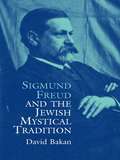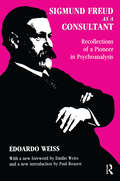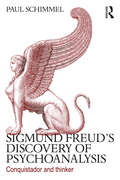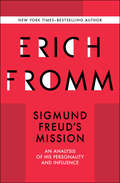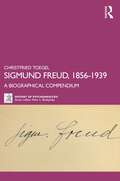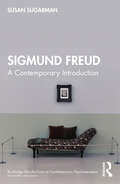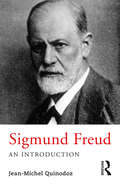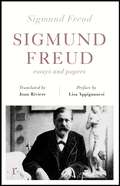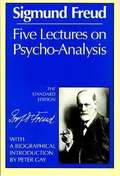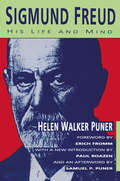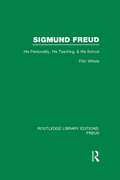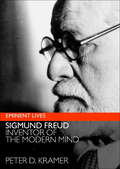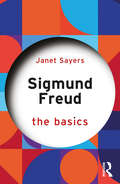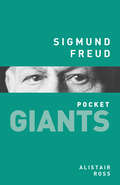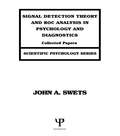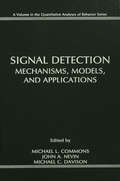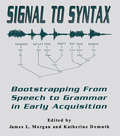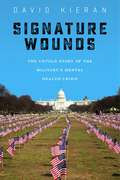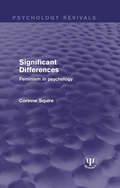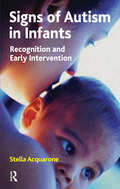- Table View
- List View
Sigmund Freud (Key Figures in Counselling and Psychotherapy)
by Mr Michael JacobsPraise for the First Edition: `This is the Second Edition of a book first published in 1992 as part of the Key Figures in Counselling and Psychotherapy series edited by Windy Dryden. It has proved a successful introduction to the life and work of Sigmund Freud: in this present edition Michael Jacobs takes the opportunity of the new translation of Freud now appearing to offer more suggestions about reading, particularly the papers of technique available through Virago's 2001 publication of the Standard Edition' - The Journal of Analytical Psychology In refreshing contrast to most other books on Sigmund Freud, this is a highly accessible account of his life and ideas, which focuses on the relevance of Freud's work for contemporary approaches to counselling and psychotherapy. The book provides an overview which is based firmly on Freud's own writings, but which goes far beyond a recapitulation of the existing literature, to offer fresh insights and some surprises, both about Freud the man and his theories. Written by bestselling author, Michael Jacobs and now fully updated for its Second Edition, Sigmund Freud presents and responds to the criticisms that Freud's work attracted, and charts his continuing influence in the 21st century. This is highly recommended reading for those training in counselling and psychotherapy as well as those studying Freud in other contexts. Michael Jacobs is a retired lecturer in Counselling Studies and bestselling author whose publications include (in the same series), D W Winicott (SAGE, 1995) and Psychodynamic Counselling in Action, Second Edition (SAGE, 1999).
Sigmund Freud Psychoanalysis and Faith: The Letters of Sigmund Freud and Oskar Pfister
by Sigmund Freud Oskar PfisterSigmund Freud Psychoanalysis and Faith: The Letters of Sigmund Freud and Oskar Pfister is a fascinating and illuminating collection of correspondence between two intellectual giants whose perspectives on life, faith, and the human psyche often stood in stark contrast. This compelling volume captures the decades-long friendship between Sigmund Freud, the father of psychoanalysis, and Oskar Pfister, a Swiss pastor and psychoanalyst, as they explored profound questions about religion, science, and human nature.Through their letters, Freud and Pfister engage in a deeply personal and intellectual dialogue, reflecting on the intersections and tensions between Freud’s atheistic and scientific worldview and Pfister’s Christian faith. Despite their differing beliefs, the two men share a mutual respect and an enduring curiosity about the mysteries of the human mind and spirit. Their exchanges offer insights into their respective theories, the development of psychoanalysis, and their shared commitment to understanding and alleviating human suffering.This collection not only reveals the private thoughts and emotions of two remarkable thinkers but also provides a lens into the cultural and intellectual climate of the early 20th century. Their letters touch on topics such as morality, the role of religion in society, and the ethical responsibilities of psychoanalysis, making this book an essential resource for anyone interested in the intersection of psychology, philosophy, and theology.Rich with wit, candor, and mutual admiration, Sigmund Freud Psychoanalysis and Faith is a testament to the power of dialogue and friendship to bridge even the widest of ideological divides. This book will captivate readers interested in the history of psychoanalysis, the psychology of religion, and the timeless quest to reconcile science and faith.
Sigmund Freud and Oskar Pfister on Religion: The Beginning of an Endless Dialogue
by Carlos Domínguez-MoranoSigmund Freud and Oskar Pfister on Religion examines the dialogue between psychoanalysis and religion through the encounters of two men: the "unfaithful Jew" who founded psychoanalysis, and a pastor of profound religious faith and proven psychoanalytic conviction. Carlos Domínguez-Morano analyses the original encounters between Freud and Pfister and their respective positions, noting the incidences, impasses and progress of their discussions. The complex interactions between psychoanalysis and religion over time are considered, and Domínguez-Morano assesses the fundamental parameters of each perspective, with reference to Catholicism. The book explores the relationship between psychoanalysis and religion as a rich, ongoing, and unending dialogue and sheds new light on the origins of psychoanalysis. Sigmund Freud and Oskar Pfister on Religion will be of great interest to academics and scholars of psychoanalytic studies, religion, the history of psychology, and the history of ideas.
Sigmund Freud and The Forsyth Case: Coincidences and Thought-Transmission in Psychoanalysis (History of Psychoanalysis)
by Maria PierriSigmund Freud and The Forsyth Case uses newly discovered primary sources to investigate one of Sigmund Freud’s most mysterious clinical experiences, the Forsyth case. The book details Pierri’s attempts to recover the lost original case notes, which are published here for the first time, to identify the patient involved and to set the case into the broader frame of Freud’s work. Maria Pierri begins with a preliminary illustration of the case, its historical context, and how it connects to Freud’s interests in "thought-transmission," or telepathy. The author illustrates the possibility of a psychoanalytic interpretation of the transference and countertransference elements potentially conveyed by certain "magical" coincidences during the analysis, introducing the reader to a psychopathology of everyday life of the setting. The book also explores Freud’s further investigations into thought transmission, focusing on a meeting of the Secret Committee in October 1919 and his clinical work with his own daughter Anna. Sigmund Freud and The Forsyth Case features supplementary historical materials, adding valuable insight to the context and meaning of the case. It will be essential reading for psychoanalysts in practice and in training, as well as academics and scholars of psychoanalytic studies, spirituality, and the history of psychology. It is complemented by Occultism and the Origins of Psychoanalysis: Freud, Ferenczi and the Challenge of Thought Transference.
Sigmund Freud and his Patient Margarethe Csonka: A Case of Homosexuality in a Woman in Modern Vienna (History of Psychoanalysis)
by Michal ShapiraThis book provides a historical analysis of one of Sigmund Freud’s least-studied cases, published in 1920 as The Psychogenesis of a Case of Homosexuality in a Woman. Scholars of sexuality often focus on Freud’s writings on male homosexuality, disregarding his views on homosexual women. This book serves as a corrective, renewing and reinvigorating interest in Freud, and demonstrating that his views on sexuality are as relevant today as ever. Part I introduces the case and explores Freud’s attitudes towards lesbianism, radical among his medical colleagues in the early twentieth century. It also puts Margarethe Csonka, the patient, at its centre. Michal Shapira considers Freud’s only treatment of a "female homosexual" and assesses Csonka’s background life before and after the encounter. Part II expands the case beyond the scientific-medical purview of the times and looks at the new opportunities afforded to women and assimilated Jews through growing equality and the modernization of urban life in 1920s Vienna. This book places Csonka’s case within the broader context of medical and psychological texts, Freud’s own writings, Jewish and queer history, and modern Vienna’s urban and art history. Sigmund Freud and his Patient Margarethe Csonka will be of great interest to psychoanalysts in practice and in training, and to readers interested in the history of gender and sexuality, feminism, modern European and urban history, the history of psychoanalysis, science and medicine, and the history of ideas.
Sigmund Freud and the Jewish Mystical Tradition
by David BakanIn this pioneering work, David Bakan challenges the popular view of Freud as an entirely secular intellectual, schooled in modern culture rather than Jewish traditions. Bakan contends that the father of psychology was profoundly influenced by mystic lore about which he appeared to know very little -- and which represents the antithesis of scientific method.This work is based on the premise that Freudian psychoanalytic theory is largely rooted in the Jewish religion, particularly the mysticism of the kabbala. In a fascinating interpretation of the blend of personality and cultural history, Bakan explains how Freud's Jewish heritage contributed, either consciously or unconsciously, to his psychological theories. The author employs Freud's own distinction between being a Jew and the acceptance of Jewish doctrine to demonstrate the effect of Jewish mysticism in the formation of Freud's technical genius.With its focus on the ways in which Freud was and was not Jewish, this study offers a model example of the problem of Jewish identity -- as embodied by one of the giants of modern science, who professed to be both "infidel" and "Jew."
Sigmund Freud as a Consultant
by Edoardo WeissSigmund Freud, despite his own reservations about philosophy, has by now earned a secure place as a philosopher. For some, Freud ranks high among modem philosophers of science, while for others he stands as one of our great modern ethical teachers. One of the great beauties of Edoardo Weiss' Sigmund Freud as a Consultant is that here we mainly find Freud as a dedicated practicing clinician. Not only did he regularly treat over half a dozen patients a day in Vienna, but he also tried through his correspondence to keep in touch with the clinical activities of his disciples abroad.Edoardo Weiss was one such disciple in whom Freud saw a central hope for the fate of psychoanalysis in Italy. Freud took Weiss into his confidence, and in his discussion of Weiss' patients one can find some of his most characteristic clinical points of view, including his moral biases both in favor of certain cases as well as against other types of human dilemmas. In its concrete details the book has much to teach. Weiss's narrative provides the circumstances surrounding the clinical cases for which he asked Freud's help. Two of Weiss's relatives went for analysis with Freud in Vienna, and they clearly did not hold back from Weiss what they had learned as well as what they considered the major limitations of Freud's approach. It is also worth noting that this volume contains the only known letter we have in which Freud openly discusses his own analysis of his youngest child, Anna.Weiss, who later left Italy and practiced for many years in Chicago, is now honored as a pioneering figure in the history of the Italian reception of Freud's work. Today the clinical practice of psychoanalysis and all things connected to it are flourishing there and the general ideology of contemporary Italy has been shaped and affected by the message Freud had to offer. Weiss' account of his relationship with Freud, as well as the clinical particularities documented here, form a permanent addition to our understanding of the early years of psychoanalysis.
Sigmund Freud's Discovery of Psychoanalysis: Conquistador and thinker
by Paul SchimmelSigmund Freud’s discovery of psychoanalysis explores links between Freud’s development of his thinking and theory and his personal emotional journey. It follows his early career as a medical student, researcher and neurologist, and then as a psychotherapist, to focus on the critical period 1895-1900. During these years Freud submitted himself to the process that has become known as his ‘self-analysis’, and developed the core of his psychoanalytic theory. Drawing on Freud’s letters to his friend and confidant Wilhelm Fliess, and on selected psychoanalytic writings in particular his ‘dream of Irma’s injection’, Paul Schimmel formulates psychoanalytic dimensions to the biographical ‘facts’ of Freud’s life. In 1900 Freud wrote that he was ‘not a thinker’ but ‘a conquistador’. In reality he was both, and was engaged in a lifelong emotional struggle to bring these contradictory sides of his personality into relationship. His psychoanalytic discoveries are conceptualized in the context of his need to achieve integration within his psyche, and in particular to forge a more creative collaboration between ‘conquistador’ and ‘thinker’. Sigmund Freud’s discovery of psychoanalysis will be of interest to psychoanalysts, psychoanalytic psychotherapists, academics and teachers of psychoanalysis, and to all serious students of the mind.
Sigmund Freud's Mission: An Analysis of his Personality and Influence (Psicologia Ser.)
by Erich FrommRenowned psychoanalyst Erich Fromm examines the creator of psychoanalysis and his followersWith his creation of psychoanalysis, Sigmund Freud redefined how people relate to themselves and to the larger world. In Sigmund Freud&’s Mission, Freud scholar and psychoanalyst Erich Fromm demonstrates how Freud&’s life experiences shaped his creation and practice of psychoanalysis. Fromm also revises parts of Freud&’s theories, especially Freud&’s libido theory. In his thorough and comprehensive analysis, Fromm looks deep into the personality of Freud, and the followers who tried to dogmatize Freud&’s theory rather than support the further stages of psychoanalysis.This ebook features an illustrated biography of Erich Fromm including rare images and never-before-seen documents from the author&’s estate.
Sigmund Freud, 1856-1939: A Biographical Compendium (The History of Psychoanalysis Series)
by Christfried ToegelSigmund Freud, 1856–1939 draws on a wide range of primary sources to present all the datable events that took place in Sigmund Freud’s life, shining new light on his day-to-day experiences. Christfried Toegel’s work provides details and context for the personal, social and political conditions under which Freud developed his theories during this time period. The book’s timeline presents not only significant events but also the small and everyday interactions and experiences in Freud’s life. Drawn from sources including Freud’s calendars, notebooks, travel journals and lists of fees, letters and visits, this unique book provides unparalleled insight into his work.Sigmund Freud, 1856–1939 will be of great interest to psychoanalysts in practice and in training, as well as academics and scholars of Freud, psychoanalytic studies, the history of science and the history of Europe.
Sigmund Freud: A Contemporary Introduction (Routledge Introductions to Contemporary Psychoanalysis)
by Susan SugarmanIn this clear and concise volume, Susan Sugarman introduces the work of Sigmund Freud and keenly illustrates the impact his pioneering contributions have had on the way we think about ourselves and each other. Part of the Routledge Introductions to Contemporary Psychoanalysis series, this book sees Sugarman offer a comprehensive overview of Freud’s major theories, their clinical application, and their empirical reach. She highlights the ways in which his work is commonly misinterpreted and expertly guides the reader through his key publications on not only his general theory but also neuroses, dreams, ordinary waking mental life, and civilization and society. Considering Freud’s body of work as a whole, she explores the observations and reasoning that led him to the questions he raised and the conclusions he reached, showing the rich and nuanced approach in his writing. Sigmund Freud: A Contemporary Introduction is an essential read for psychoanalysts, both in practice and in training, as well as students and scholars looking to understand the legacy of Freud’s work.
Sigmund Freud: An Introduction
by Jean-Michel QuinodozJean-Michel Quinodoz introduces the essential life and work of Sigmund Freud, from the beginning of his clinical experiences in Vienna in the 1880s to his final years in London in the 1930s. Freud’s discoveries, including universally-influential concepts like the Oedipus complex and the interpretation of dreams, continue to be applied in many disciplines today. Elegantly and clearly written, each chapter leaves the reader with a solid framework for understanding key Freudian concepts, and an appetite for further knowledge. Accessible for readers inside and outside the field of psychoanalysis, there is nothing at all equivalent in English. The book starts with Freud’s life before the discovery of psychoanalysis, spanning from 1856 to 1900, when The Interpretation of Dreams was published. The subsequent chapters are devoted to the presentation of the key notions of psychoanalysis. A chronological perspective shows how Freud's work has been constantly enriched by the successive contributions of Freud himself, as well as his successors. Freud’s contributions are also embedded in the daily, clinical practice of psychoanalysis and psychotherapy. The last chapter concerns Freud’s life from 1900 to 1939, the year of his death. This fascinating, concise and accessible introduction to the life and work of Sigmund Freud, one of the most influential and revolutionary figures of the nineteenth and twentieth centuries, by internationally-renowned author Jean-Michel Quinodoz, will appeal to both professional readers and anyone with an interest in psychoanalysis, psychotherapy and the history of ideas.. The book presents the major contributions of Sigmund Freud in their nascent state, as and when they appeared, and shows that they are as alive today as ever.
Sigmund Freud: Essays and Papers (riverrun editions)
by Sigmund Freud'Freud the writer is what Joan Riviere so elegantly presents to the English-Language reader'Lisa Appignanesi from her preface to Sigmund Freud: Essays and PapersThis collection focuses in on the set of Riviere's translations that made up the first library of Freud in English. Including his papers on metapsychology, applied psychoanalysis and technique, and within those broader categories are subjects as diverse as narcissism, love, paranoia and homosexuality. Riviere's great understanding of Freud's work is evident as we see his engrossingly direct arguments - the style that distinguished him from academics of his day - take shape in her talented translations. We are presented with Freud's various guises, both an essayist and master storyteller he brings to life the vagaries of his patients. Riviere was a major player in disseminating psychoanalysis into English, 'no less than the man she translated is she a figure to be hidden from history', in this collection the translator and the scientist come together in a rich, engrossing brew.
Sigmund Freud: Five Lectures on Psycho-Analysis
by Sigmund Freud James Strachey Peter GayFreud approved the overall editorial plan, specific renderings of key words and phrases, and the addition of valuable notes, from bibliographical and explanatory. Many of the translations were done by Strachey himself; the rest were prepared under his supervision. The result was to place the Standard Edition in a position of unquestioned supremacy over all other existing versions. Newly designed in a uniform format, each new paperback in the Standard Edition opens with a biographical essay on Freud's life and work —along with a note on the individual volume—by Peter Gay, Sterling Professor of History at Yale.
Sigmund Freud: His Life and Mind
by Helen Walker PunerFreud's development of psychoanalysis is one of the great fault lines of twentieth-century cultural history. The field as such provides one of the great professional dramas of our time: a classic struggle between a new, vital idea and the ignorance, prejudice and refusal that so often attend major breakthroughs and innovations. Helen Puner's biography is far more than a professional appreciation. It is the story of a complex, by no means flawless individual, whose personal characteristics helped sow the seeds of controversy as well as ultimately establish a new field. Upon its initial appearance, the Herald Tribune identified the book as "the first authoritative and profoundly perceptive biography of the man who more than any other has shaped the thinking of the Western World." It was summarized as a "brilliant performance, done without fear."Puner did precisely what irritated Freud most: probe the sources, social no less than personal, religious no less than scientific, that made Freud such a towering figure. Dorothy Canfield caught the spirit of this work when she noted that in this book, we see Freud "as we never saw him before, as most of us never knew he was, a rigidly virtuous, deeply troubled, upright, dutiful Jewish son, husband and father. We see him tracing the significance of clues he hit upon in the practice of medicine, and then fit these clues into the bewildering mastery of human behavior."In his Foreword, Erich Fromm indicates that Puner looks at Freud with genuine admiration, but without idolatry. "She understands his own psychological problems and has a full appreciation of the pseudo-religious nature of the movement which he created." And the late Ernest Becker, in The Denial of Death, seconded this estimate by calling the Helen Walker Puner effort "a brilliant critical biography." This new edition contains a new introduction by Paul Roazen; with this, and the appreciation of the author by her husband, Samuel Puner, we can better locate the author of the book as well as the famous object of her analysis.
Sigmund Freud: His Personality, his Teaching and his School (Routledge Library Editions: Freud)
by Fritz WittelsOriginally published in 1924, this biography of Freud looks at his early life as well as the development of his theories and his relationships with other well-known physicians of the time.
Sigmund Freud: Inventor of the Modern Mind (Eminent Lives)
by Peter D. KramerReferred to as "the father of psychoanalysis," Sigmund Freud is credited with championing the "talking cure" and charting the human unconscious. Both revered and reviled, he was a brilliant innovator but also a man of troubling contradictions—sometimes tyrannical, often misrepresenting the course and outcome of his treatments to make the "facts" match his theories. Peter D. Kramer—acclaimed author, practicing psychiatrist, and a leading national authority on mental health—offers a stunning new take on this controversial figure. Kramer is at once critical and sympathetic, presenting Freud the mythmaker, the storyteller, the writer whose books will survive among the classics of our literature, and the genius who transformed the way we see ourselves.
Sigmund Freud: The Basics (The Basics)
by Janet SayersSigmund Freud: The Basics is an easy-to-read introduction to the life and ideas of Sigmund Freud, the founder of psychoanalysis and a key figure in the history of psychology. Janet Sayers provides an accessible overview of Freud’s early life and work, beginning with his childhood. Her book includes the stories of his most famous patients: Dora, Little Hans, the Rat Man, Judge Schreber, and the Wolf Man. It also discusses Freud’s key ideas such as psychosexual development, the Oedipus complex, and psychoanalytic treatment. Sayers then covers Freud’s later work, with a description of his observations about depression, trauma and the death instinct, as well as his 1923 theory of the id, ego, and superego. The book includes a glossary of key terms and concludes with examples of how psychoanalysis has been applied to the study of art, literature, film, anthropology, religion, sociology, gender politics, and racism. Sigmund Freud: The Basics offers an essential introduction for students from all backgrounds seeking to understand Freud’s ideas and for general readers with an interest in psychology. For those already familiar with Freudian ideas, it offers a helpful guide to their interdisciplinary applications and context not least today.
Sigmund Freud: pocket GIANTS
by Alistair Ross‘This is a very, very smart book. It makes Freud accessible, interesting and relevant.’ - Ruby WaxSigmund Freud is rightly called the godfather of psychoanalysis. He forever changed the way we view ourselves and developed our understanding of human nature. His concepts have become part of our psychological vocabulary: unconscious thoughts and feelings, conflict, the meaning of dreams, the sensuality of childhood. He dared to try new methods and treatments. Everyone knows the term Freudian slip and has a basic understanding of his theories, however, Freud gave us a great deal more. From education to critical theory he changed the way we think. His ideas and clinical practices offer psychological insights that bring help and healing. Freud's work has suffused contemporary Western thought and popular culture. He is the epitome of a pocket GIANT.
Signal Detection Theory and ROC Analysis in Psychology and Diagnostics: Collected Papers (Scientific Psychology Series)
by John A. SwetsSignal detection theory--as developed in electrical engineering and based on statistical decision theory--was first applied to human sensory discrimination 40 years ago. The theoretical intent was to provide a valid model of the discrimination process; the methodological intent was to provide reliable measures of discrimination acuity in specific sensory tasks. An analytic method of detection theory, called the relative operating characteristic (ROC), can isolate the effect of the placement of the decision criterion, which may be variable and idiosyncratic, so that a pure measure of intrinsic discrimination acuity is obtained. For the past 20 years, ROC analysis has also been used to measure the discrimination acuity or inherent accuracy of a broad range of practical diagnostic systems. It was widely adopted by methodologists in the field of information retrieval, is increasingly used in weather forecasting, and is the generally preferred method in clinical medicine, primarily in radiology. This book attends to both themes, ROC analysis in the psychology laboratory and in practical diagnostic settings, and to their essential unity. The focus of this book is on detection and recognition as fundamental tasks that underlie most complex behaviors. As defined here, they serve to distinguish between two alternative, confusable stimulus categories, which may be perceptual or cognitive categories in the psychology laboratory, or different states of the world in practical diagnostic tasks. This book on signal detection theory in psychology was written by one of the developers of the theory, who co-authored with D.M. Green the classic work published in this area in 1966 (reprinted in 1974 and 1988). This volume reviews the history of the theory in engineering, statistics, and psychology, leading to the separate measurement of the two independent factors in all discrimination tasks, discrimination acuity and decision criterion. It extends the previous book to show how in several areas of psychology--in vigilance and memory--what had been thought to be discrimination effects were, in reality, effects of a changing criterion. The book shows that data plotted in terms of the relative operating characteristic have essentially the same form across the wide range of discrimination tasks in psychology. It develops the implications of this ROC form for measures of discrimination acuity, pointing up the valid ones and identifying several common, but invalid, ones. The area under the binormal ROC is seen to be supported by the data; the popular measures d' and percent correct are not. An appendix describes the best, current programs for fitting ROCs and estimating their parameters, indices, and standard errors. The application of ROC analysis to diagnostic tasks is also described. Diagnostic accuracy in a wide range of tasks can be expressed in terms of the ROC area index. Choosing the appropriate decision criterion for a given diagnostic setting--rather than considering some single criterion to be natural and fixed--has a major impact on the efficacy of a diagnostic process or system. Illustrated here by separate chapters are diagnostic systems in radiology, information retrieval, aptitude testing, survey research, and environments in which imminent dangerous conditions must be detected. Data from weather forecasting, blood testing, and polygraph lie detection are also reported. One of these chapters describes a general approach to enhancing the accuracy of diagnostic systems.
Signal Detection: Mechanisms, Models, and Applications (Quantitative Analyses of Behavior Series)
by Michael L. Commons John A. Nevin Michael C. Davison Sheila M. McDonaldThis volume is based on the 10th annual Harvard Symposium for the Quantitative Analysis of Behavior. The first Harvard Symposium was devoted to signal-detection analyses of reinforcement and choice behavior. The present volume reprises the original signal- detection theme, incorporating additional insights based on experimental and theoretical analyses undertaken during the years separating the two conferences. This collection illustrates how signal-detection theory, first advanced to account for performance in threshold-level sensory discrimination, has broadened to encompass a variety of psychological problems involving discriminations between confusable stimuli. The approach is quantitative in its emphasis on estimation of independent parameters of the discrimination process, and analytical in its efforts to separate the determiners of discriminability and bias and to identify the mechanisms of their operation. Above all, the book is broadly integrative in its approach to diverse problems. This volume is based on the 10th annual Harvard Symposium for the Quantitative Analysis of Behavior. The first Harvard Symposium was devoted to signal-detection analyses of reinforcement and choice behavior. The present volume reprises the original signal- detection theme, incorporating additional insights based on experimental and theoretical analyses undertaken during the years separating the two conferences.
Signal to Syntax: Bootstrapping From Speech To Grammar in Early Acquisition
by James L. Morgan Katherine DemuthIn the beginning, before there are words, or syntax, or discourse, there is speech. Speech is an infant's gateway to language. Without exposure to speech, no language--or at most only a feeble facsimile of language--develops, regardless of how rich a child's biological endowment for language learning may be. But little is given directly in speech--not words, for example, as anyone who has ever listened to fluent conversation in an unfamiliar language can attest. Rather, words and phrases, or rudimentary categories--or whatever other information is required for syntactic and semantic analyses to begin operating--must be pulled from speech through an infant's developing perceptual capacities. By the end of the first year, an infant can segment at least some words from fluent speech. Beyond this, how impoverished or rich an infant's representations of input may be remains largely unknown. Clearly, in the debate over determinants of early language acquisition, the input speech stream has too often been offhandedly dismissed as a potential source of information.This volume brings together internationally-known scholars from a range of disciplines--linguistics, psychology, cognitive and computer science, and acoustics --who share common interests in how speech, in its phonological, prosodic, distributional, and statistical properties, may encode information useful for early language learning, and how such information may be deciphered by very young children. These scholars offer a spectrum of viewpoints on the possibility that aspects of speech may provide bootstraps for language learning; contribute important, state-of-the-art findings across a variety of relevant domains; and illuminate critical directions for future inquiry. The publication of this volume represents a significant step in renewing the bonds between two fields that have long been sundered--speech perception and language acquisition.
Signature Wounds: The Untold Story of the Military's Mental Health Crisis
by David KieranThe surprising story of the Army’s efforts to combat PTSD and traumatic brain injury The wars in Iraq and Afghanistan have taken a tremendous toll on the mental health of our troops. In 2005, then-Senator Barack Obama took to the Senate floor to tell his colleagues that “many of our injured soldiers are returning from Iraq with traumatic brain injury,” which doctors were calling the “signature wound” of the Iraq War. Alarming stories of veterans taking their own lives raised a host of vital questions: Why hadn’t the military been better prepared to treat post-traumatic stress disorder (PTSD) and traumatic brain injury (TBI)? Why were troops being denied care and sent back to Iraq? Why weren’t the Army and the VA doing more to address these issues? Drawing on previously unreleased documents and oral histories, David Kieran tells the broad and nuanced story of the Army’s efforts to understand and address these issues, challenging the popular media view that the Iraq War was mismanaged by a callous military unwilling to address the human toll of the wars. The story of mental health during this war is the story of how different groups—soldiers, veterans and their families, anti-war politicians, researchers and clinicians, and military leaders—approached these issues from different perspectives and with different agendas. It is the story of how the advancement of medical knowledge moves at a different pace than the needs of an Army at war, and it is the story of how medical conditions intersect with larger political questions about militarism and foreign policy. This book shows how PTSD, TBI, and suicide became the signature wounds of the wars in Iraq and Afghanistan, how they prompted change within the Army itself, and how mental health became a factor in the debates about the impact of these conflicts on US culture.
Significant Differences: Feminism in Psychology (Psychology Revivals)
by Corinne SquireCurrent western feminism and psychology have a particularly close relationship, with feminism finding an increasingly important voice in psychology. In this clear introductory text, originally published in 1989, Corinne Squire examines what feminism and psychology mean to each other, concentrating on the different ways in which feminism is articulated in psychology. Each of the feminist ‘movements’ within psychology is explored, with clear and critical explanations of the ways in which they differ significantly from conventional psychology. Squire looks at the dominant, egalitarian form of feminist psychology, which tries to work within traditional psychology, and at the woman-centred feminist psychology, which has developed largely outside the conventional discipline, and analyses the limitations and advantages of these approaches. She goes on to look at more complex feminist attempts to deal with psychological concerns, and identifies feminist initiatives, throughout psychology and outside it, which manage to address psychological issues but refuse to respect the boundaries of mainstream psychology, forming instead helpful associations with other forms of knowledge in order to change the nature of psychological discourse.
Signs of Autism in Infants: Recognition and Early Intervention
by Stella AcquaroneAs a group, babies later diagnosed as autistic are found to have more complications during gestation and delivery than their normal siblings and others. In addition to all these complications, infants later diagnosed on the autistic spectrum have a two-fold rate of residence in neonatal intensive care units. Over the past 50 years, ever younger previously non-viable very low weight babies are being kept alive, some born as much as four months before term. However, it is becoming apparent that miraculous procedures to counteract organ immaturity and prolonged incubation contribute to a new gamut of hitherto unknown forms of neurological damage. With pregnancy curtailed, prematurely separated mothers and their babies both experience a prolonged state of limbo, with the fragile infant being exposed to excruciating medical interventions and overwhelming stimulation. International researchers and clinicians renowned for their work in the field of early autism come together to resolve queries around the long debate on the development and resolution of autism.
